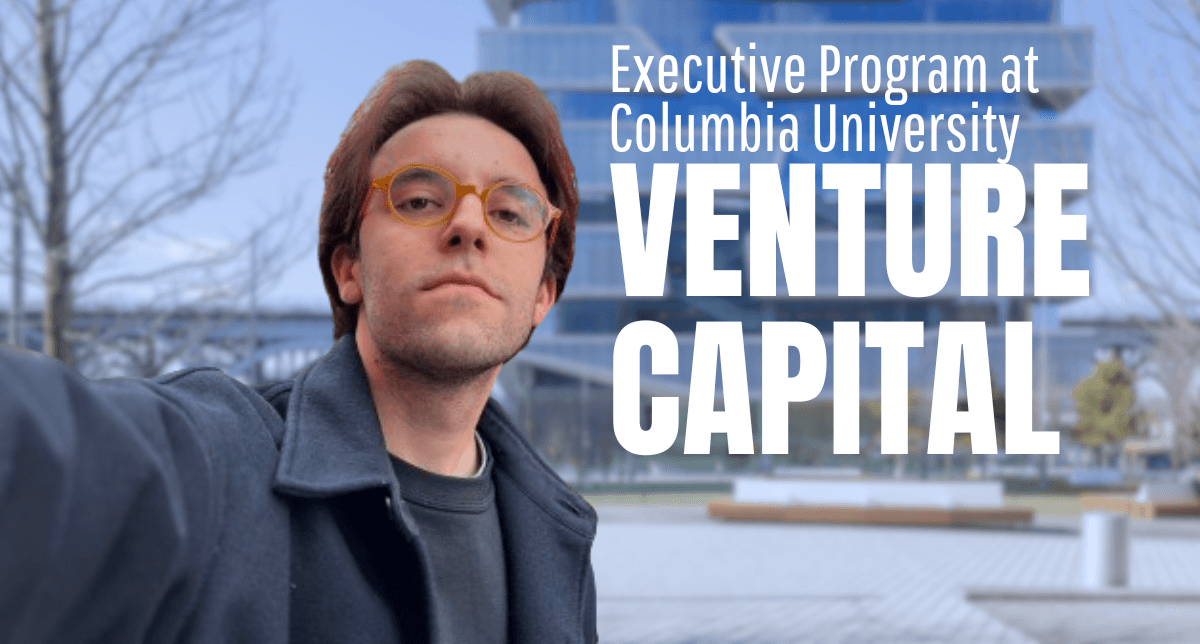Apr 16, 2024
6min read
5+ learnings from "VC: Investing in early-stage startups" - a Columbia executive program.
TL;DR 🤓
I think the most interesting part of the article are the "rules of thumb" I learned from professor Angela Lee through her experience at 37 Angels
These are some of them:
Investment Returns: About 50% of VCs return less than the invested amount. The benchmarks are less than 1x for 50%, 1-3x for 30%, 3-5x for 15%, and 10-20x for 5% of investments.
Seed Valuation Ranges: Early-stage companies typically see valuations ranging from $1M-$5M in New York, $1M-$10M in San Francisco, and $1M-$2.5M in Tokyo.
Investment Rounds Indicators: Founders typically invest during early rounds; friends, family, and fools might contribute $100K-$500K; seed stages often are post-revenue; and Series A usually targets companies with around $1M in revenue.
Desirable Investment Multiples: A good investment return for VCs is considered to be 3x, whereas for Private Equity firms, 2x is favorable.
Other Metrics: VCs typically aim for an 8-year exit timeline, with an average minimum investment ticket of $25,000, and commonly invest in around 30 companies to diversify risk.
Introduction
Two weeks ago, I had the chance to attend a Columbia Business School's executive program. It's called "Venture Capital: Investing in early-stage startups".
It was only a 3-day program, with 30 students (or "executive students") and a lot of content regarding Venture Capital, Portfolio Management, Investment Strategies, Startup Valuation, to name some.
I like writing down what I learn after this kind of courses for two reasons: (1) to refresh what I studied, and (2) to share with you all the main learnings I took from it.
I have organized it in the following way:
CONCEPTS
Why do VCs invest in early-stage startups?
How do they make money?
VCs versus Angels
Accelerators: Why do founders go to accelerators?
HOW TO EVALUATE AN EARLY-STAGE STARTUP
PEOPLE
PROBLEM
PROGRESS
PRICE
And, throughout the article, I've written down some RULES OF THUMB:
Seed investment multiples and valuations
Good multiples for Private Equity firms and for VC firms
Deal flow "sales" channel
Why do VCs invest in early-stage startups?
I am sure at some point you have tried to convince your mom or a friend of an amazing idea you have. You have gone through how you will make money, why is your product so unique, and why you will win your amazingly big competition.
The difference between a VC and your mom, is that a VC may actually invest in your idea.
Jokes aside, VC is risky. In Spanish, it's called "capital riesgo" - risk capital. That pretty much sums it up.
But, with high risks, come high returns (sometimes).
50% of VCs return less than what you invested after 5 to 10 years
Considering this little detail - 1/2 times investors lose their money -, VCs aim for a 10x. That means multiplying the investment 10 times.
Providing this kind of return requires investing in early stages, and divesting in later stages.
To divest, the VC needs to exit. It can do so through an IPO (10% of the cases in the US), or through an Acquisition (90%).
There are around 200 IPOs a year in the United States
So, it is not easy to found the company that can go IPO.
-- Why would a founder be interested in getting money from a VC?
We can think from the other perspective. Why would an entrepreneur that is just starting his/her business be prone to giving away equity?
You guessed it: money. But that's one factor. They usually let VCs come in at early-stages for network and advice purposes. Not just for money, but for "smart money".
How do they make money?
That's a question my father asks me a lot. "How can VCs invest in companies that are not profitable?". It is, indeed, a difficult question to answer without looking like the Wolf of Wall Street.
A VC buys equity from a startup for a given valuation
This valuation is set based on industry and stage standards (or maybe just because they like the number). Let's imagine a VC invests $1m for a $10m valuation. It has 10% of the company.
When the company, usually 18 month from now, asks for more money, in an ideal case, the valuation will go up. Then, the VC can "exit". So, can sell his 10% of equity.
Buy cheap, sell expensive.
Easy, right?
Here are some rules of thumb:
VCs versus Angels
That's easy:
VCs invest other people's money, and usually have a narrow scope. They earn through fees or carries.
Angels invest their own money, and usually have a wider scope. They often pay to be in an Angel Network to have a good deal flow - that is, to be well-connected to startups searching for funding. They pay around USD$2-5,000 per year to be in these networks.
Accelerators: Why do founders go to accelerators?
To the point:
BRAND: It's a reputational thing. Instead of having the logo of a real nice university where you have done an MBA, you have the logo of a good accelerator.
RAISING MONEY IN DEMO DAY: Accelerators connect you with investors after 2-3 months
ADVISORY: Get good advice from usually top-tier professionals
LITTLE CAPITAL AT THE BEGINNING
OFFICE SPACE / LABS
That's why founders want to get in an accelerator. But what do accelerators get? Exactly: cheap equity.
Famous accelerators are:
Entrepreneurs Roundtable Accelerator
How to evaluate early-stage startups?
PEOPLE
Here is where the VC analyses:
What's the challenge of the startup?
Does the team know how to solve this challenge? Do they have the domain expertise? -- Domain expertise is more important in B2B
Co-CEOs are a red-flag
Solo-founders are a yellow-flag - They have to be self-aware, and give good equity for CFO and COO.
Diversity and complementary teams are a green flag
Serial entrepreneurs are a green flag - more even for B2B startups
Self-aware founders are a green flag
Consider who are the next couple of hires
Do the entrepreneurs have the "IT FACTOR"?
Average age of entrepreneurs are between 40-47 years
Would you work for that person
PROBLEM
To the point:
TAM is usually not relevant. SAM and SOM are revenue-linked, so they are the important ones.
SAM should include those countries the startup will develop in
The aim here is to (1) understand market size and if it is worth approaching, and (2) evaluate whether founders know the market.
Evaluate whether founders understand, not only direct competition, but also indirect one.
Search market maps. And, remember:
Having competition is not a bad thing. It validates the market.
Moreover, founders should have deep understanding of the customer (demographically, psychographically and geographically). Here, the VCs usually ask around 100 customer interviews, surveys and/or own historical data, if there is some.
PROGRESS -- aka TRACTION
It is great to have a clear sales funnel, with some conversion metrics from phase to phase.
For instance, "I have tried email marketing, SEO and attending events, and I have chosen email marketing because...".
And these are some other metrics to consider:
PRICE
Here is where you evaluate whether the following make sense:
Startup valuation
Use of funds
Deal structure and cap table
It is quite, let's say, "creative". Startup valuation and use of funds depend on the industry and stage of the company is located. So I would search and see if it makes sense with industry standards, or doesn't.
Other things to consider
Then, we did a bunch of exercises regarding valuation, dilution and some math regarding in this branch.
We also talked about the differences between price equity, convertible notes and SAFEs. We also went through some terms, liquidation preferences, vesting, cliffs, and a bunch of valuation methods - scorecard, risk factor, dilution method, VC method, market based method, etc.
My insight here, is that it is quite ad-hoc. Depends on each case, and on the feeling the startup has on VCs.
It has to fulfill some main requirements, but then it's about sensations.
WRAP UP
If you read until here, I want to thank you. Hope it was an interesting piece. My take in all of these is that "rules of thumb" are key to understand how the market is doing.
And, to get those rules, you have to be well-connected. Constantly in-touch with VCs, angel investors, and have a nice deal flow, to see what people are doing.
It is quite a business of following what people do. At least that's my opinion.
Let's keep in touch, and really appreciate your time reading until here.
Big hug!


